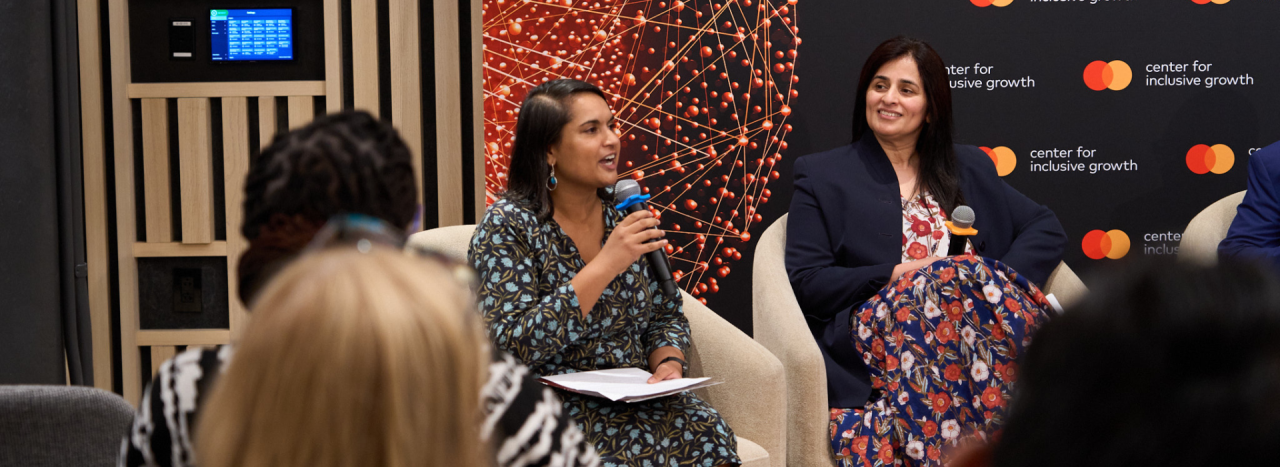Mastercard: How Data and AI Can Drive Change: 4 Ways Forward
Rhea-AI Summary
The Mastercard Center for Inclusive Growth hosted the third annual Impact Data Summit in Manhattan, focusing on using technology and data for social good. The event brought together leaders from various sectors to discuss topics like narrowing the data inequality gap, cultivating future data talent, and responsible regulation.
Key takeaways from the summit include:
- Involving people facing challenges in developing AI solutions
- Focusing on problem-solving rather than just applying new technology
- Implementing responsible regulation to build trust in AI
- Emphasizing global cooperation for inclusive AI development
The summit highlighted real-world examples of AI applications, such as the DISHA initiative for disaster response and AI-powered healthcare improvements in Rwanda. Speakers emphasized the importance of inclusive AI development and addressing global challenges through public-private partnerships.
Positive
- Mastercard is actively promoting responsible and inclusive AI development through its Impact Data Summit
- The company is fostering partnerships across sectors to address global challenges using AI and data science
- Mastercard is positioning itself as a thought leader in ethical AI and data use for social good
Negative
- None.
News Market Reaction 1 Alert
On the day this news was published, MA declined 0.12%, reflecting a mild negative market reaction.
Data tracked by StockTitan Argus on the day of publication.
By Vicki Hyman
NORTHAMPTON, MA / ACCESSWIRE / October 3, 2024 / Mastercard

Banner photo, from left, Payal Dalal, executive vice president of global programs at the Mastercard Center for Inclusive Growth, and Komal Sahu, chief of sustainable finance for AVPN. (Photo credit: Awa Dia)
Mastercard Center for Inclusive Growth
Predictions of the artificial intelligence boom from just two years ago were prone to extremes: On one hand, there were rose-color-tinged tales of AI solving every problem, and on the other, dystopian visions of a world ruled by robots. Both seem to have crashed into reality.
At the third annual Impact Data Summit hosted by the Mastercard Center for Inclusive Growth at the company's Tech Hub in Manhattan, "pragmatic optimism" and "idealistic realism" were the watchwords.
Held during United Nations Week, the summit drew leaders from across politics, multilateral organizations, academia, nonprofits and the tech world to share insights on how to use technology and data for good. Discussions ranged from narrowing the data inequality gap to cultivating future data talent to responsible regulation. The day was laced with real-world examples of inclusive AI in action and how public-private partnerships can accelerate impact.
For example, an initiative called DISHA, or Data Insights for Social Humanitarian Action, brings together technologists, academics, philanthropists and other partners to scale AI products. DISHA, led by the U.N. Global Pulse innovation lab, recently unveiled a new product that identifies damaged buildings from satellite images following a disaster event six times faster than on-the-ground experts, said Katya Klinova, who leads data and AI efforts for the lab.
"Humanitarians need this analysis as soon as possible," she said. "Every hour can mean the difference between lives saved and lost, and these projects only become possible when, across many organizations, people work as one team."
In Rwanda, global AI consultancy Sand Technologies wanted to pilot a "clinic in a box" - a way of harnessing AI in rural areas to supercharge diagnostics, said founder and CEO Fred Swaniker.
Today, Swaniker said, the health ministry can see how many babies were born on a given day and where disease is flaring by district. "It's shifted the entire healthcare system from being reactive and expensive to be more predictive and preventative - and at large scale."
Here are four takeaways on how to harness AI and data science responsibly, inclusively and in ways that will benefit the most people:
01
People facing the challenge need to be part of the solution
A recent report revealed that AI will add
In India, Manu Chopra co-founded the AI nonprofit Karya, which pays its Indian workers, many of them women, far above the minimum wage to train AI systems. One project employed 30,000 low-income women across six language groups, and the resulting AI model was "less misogynistic, it's more intentional," he said. "It serves our communities better."
It's particularly important to listen to and support young people, because the stakes are highest for them. Rumman Chowdhury is U.S. Science Envoy for artificial intelligence and the co-founder and CEO of Humane Intelligence, and she discussed a recent visit to the South Pacific, where she met with young tech entrepreneurs who were developing AI-powered solutions to address the region's challenges with rising sea levels.
"One young woman was pitching a hydroponics AI startup that actually was already yielding cheaper and more bioavailable vegetables," Chowdhury says. "So they are the ones that are tackling the big problems, because the big problems overwhelmingly face them."
02
Innovation doesn't mean reinventing the wheel
"Is that an AI-shaped problem?" is a question Sam Miller's colleagues would often ask. Miller is the director of Google DeepMind Impact Accelerator, and she said some challenges just aren't relevant to AI.
Swaniker agreed. Just because generative AI is new and exciting doesn't mean it's right for the job, he said. "People have suddenly forgotten that AI has been around for 40 years, and there's a lot of other tools before large language models. Large language models are almost like a hammer looking for a nail … Start with the problem, not the technology."
That was echoed later in the day by Caitlin Augustin, the vice president of products and programs at Datakind, which uses data science and AI to improve the capabilities, reach and scale of social impact organizations. "That is the key to making AI, to making any solution available to all - you have to build it in the context that it will be used," she said. Don't build a complex model for an organization with connectivity issues. Don't build a tool for the desktop if your clients are all mobile phone users. "You have to invest in solving the problem, and build the solution to match the context it will be used in."
03
Responsible regulation builds trust
You wouldn't want to board a plane if there were no safety rules in place, said Caroline Louveaux, Mastercard's chief privacy and data responsibility officer. "Good regulation can benefit everyone," she said, adding that it can boost trust and provide legal certainty, and should be aimed at areas that present real risk to people, like hiring and health care. Standardizing regulations globally is equally important: "AI does not have any borders, so we need to have consistency as much as possible," she said.
What else is missing from the discussions about ethical AI? Standardized measurements and benchmarking and a strong audit and certification ecosystem, said Navrina Singh, the CEO and founder of Credo AI, a startup that builds software that provides oversight and accountability of AI systems. "There's amazing new governance structures that companies are putting in place, but as you look inside the hood, you see all these measurements are missing."
In a separate panel on global coordination of data standards, Dana Imad Hamzah, the assistant undersecretary of the Kingdom of Bahrain's Ministry of Sustainable Development, pointed to the work her country is doing to understand the data they have and how to ensure it's accurate, accessible and fit to deliver valuable insights.
"There's such need for someone to take on ownership and coordination of standard-setting and consistent approaches," said Payal Dalal, the executive vice president of global programs for the Center for Inclusive Growth, who led the panel. "It sounds like in Bahrain, you've got a blueprint and a template that many other governments can follow so that we can really harness the power of data."
04
Despite geopolitical changes, cooperation is necessary for inclusive AI
"It's instructive to look at the lessons learned," said Jon Huntsman, Mastercard's vice chairman and president for Strategic Growth. "What has [technology] done for humanity? Where has it misfired? What governing structures have been good versus less good? Let history be our guide … The inclusive nature of what we're embarking on must be part of it. The divisions globally are too profound."
Carme Artigas Brugal, the co-chair of the U.N.'s co-chair AI Advisory Body, echoed his remarks. "We can compete for market share. We can compete for technology leadership, but we cannot compete for safety, and we cannot compete for human rights."
We are only beginning to realize the societal impacts of technology, from mental health changes to shifts in the workplace, and that requires a sophisticated understanding of technology's implications and a global dialogue about the benefits of AI and how they can be shared, particularly in Africa, said Amandeep Singh Gill, the U.N. Secretary-General's envoy on technology. "By investing there, we can make sure we get our AI future right."
Originally published by the Mastercard Center for Inclusive Growth
Follow the Mastercard Center for Inclusive Growth's journey to advance equitable and sustainable economic growth and financial inclusion around the world by following us on LinkedIn and Instagram.
View additional multimedia and more ESG storytelling from Mastercard on 3blmedia.com.
Contact Info:
Spokesperson: Mastercard
Website: https://www.3blmedia.com/profiles/mastercard
Email: info@3blmedia.com
SOURCE: Mastercard
View the original press release on accesswire.com






